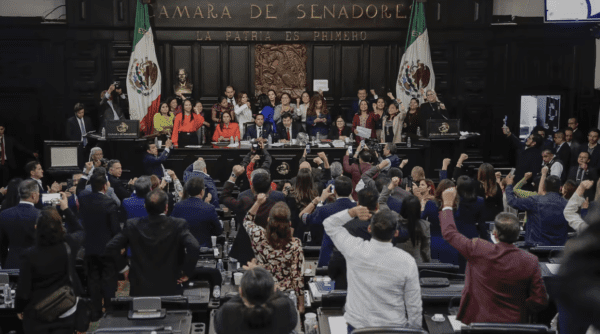Mexico’s head of government on the road to institutional debilitation.
By the end of this year, fifty-four democratic elections will be held. Some have already determined the trajectory of nations, while others remain on the horizon to determine the foreign policy and relations between countries through a new governmental period. It is an era in which polarization and social divide are notorious. Socioeconomic inequalities and contrasting party identities divide society into different tribes, increasing the ideological gaps and causing what Samuel P Huntington would describe as a Clash of Civilizations based on cultural identity. While polarisation has not been as present in all elections held so far, Mexico was a region where the electoral process was highly polarised, causing social gaps and divides based on party preferences. Political polarization is not only present in society but continues to be a challenge at the highest administrative bodies of the government. On September 11th, with a narrow difference of three votes, AMLO’s previously proposed judicial reforms were passed in the Senate of the republic, causing a strike in the Supreme Court of Justice.
Once again, the left-wing party MORENA (Movimiento de Regeneration Nacional) will be in power for six years, led by Claudia Sheinbaum – the first woman elected to lead the country. As in many polarised societies, her victory was celebrated and criticised by academics who agree or disagree with her political standing. The only thing that those opposing her political standing could do is hope for a shift from Lopez Obrador’s path and push her own agenda for cleaner energy, taking advantage of the nearshoring opportunities and maintaining solid trade relations with the United States and Canada to increase investment, foreign capital and development in the country. Yet, the reforms passed on September 11th by the Senate of the republic jeopardise the interest of foreign investors and the USMCA trade relations itself.
It is important to note that Mexico has an electoral process in which senators come into power before the republic’s new president. This weird timing allowed Lopez Obrador’s previously rejected reforms to be voted on again, now with a qualified majority thanks to the support of the left-wing party alliance. What many feared would happen became a reality: the president took advantage of this period to advance his reform package, part of the so-called “4T” (“fourth transformation”) political agenda.
Popular election of judicial authorities, lower requirements, and invisible judges are the backbone of the reform.
The popular vote has been one of the main focuses of the current president’s discourse, which is why he has conducted popular surveys on multiple occasions to validate the call to vote on this piece of legislation in the Senate and the Chamber of Deputies. Similarly, back in 2018, with the cancellation of the Texcoco airport mega-project – the largest infrastructure project cancellation in the country’s history – the judicial reform followed the same path. A survey was conducted at the Mexico City Zocalo to evaluate the supposed willingness of the “people” to implement AMLO’s constitutional amendment. For several reasons, these surveys have no substance and are a joke to any social sciences researcher. The survey samples are not randomly selected, external validity is non-existent, the design of the surveys has serious biases, the sample sizes are insufficient to represent the country’s population, and they do not mirror the country’s demographics. Such processes are undemocratic and unprofessional and show flawed results.
The reforms were passed on September 11th and enacted by President Andres Manuel Lopez Obrador on September 15th, causing a strike in the Supreme Court followed by a shock of economic volatility in the world’s 12th-largest economy and a leading US trade partner. Despite the country’s urgent need for judicial reform to eliminate corruption and ensure a strong rule of law to deliver justice, the reforms voted in the Senate are only a step backwards towards weakening this government branch and jeopardising the rule of law. The reduction in requirements to become a member of the Supreme Court by eliminating the minimum age rule of 35 years and cutting in half the minimum work experience (now, only five years of previous experience in the legal world are necessary to become a judicial authority in Mexico) undermine the integrity of the judiciary. More importantly, 7000 judges and magistrates will be selected through direct popular elections. While the head of government argues that this will ensure a judicial power represents the “different visions that make up the Mexican society”, academics emphasise the potential government interference in judicial independence by creating a judicial body loyal to the government rather than impartial, leading to biassed rulings in favour of the government’s interests.

Jeopardising FDI and Democracy
Lopez Obrador’s government has worsened the social divide by blaming the private sector for low wages and inequality in the territory. Inequality gaps are huge, and much of the economic power is concentrated in the hands of the few. Nevertheless, since the country opened up economically with the United States by eliminating tariffs through NAFTA (North American Free Trade Agreement), inequality levels have dropped drastically, which proves the importance of investment and the private sector in developing countries. The government can follow its left-wing agenda by increasing social programs, worker rights, and minimum wage while ensuring that free trade remains untouched and pushing towards a strong, competitive and diversified economy.
The reforms threatened diplomatic and trade relations with the United States and Canada due to criticism by the diplomatic services of both countries. The president of Mexico announced a pause of diplomatic ties with the United States and Canada for their ‘interventionism’ in Mexican affairs and for offending ‘the independence and sovereignty’ of the republic. The president’s allegations only severed strong diplomatic ties and endangered the USMCA. The free trade agreements will potentially be renegotiated again once the new U.S. administration comes to power.
“A Significant Risk to the Functioning of Mexico’s Democracy”
This is how Ken Salazar, the US ambassador to Mexico, described the reforms. Furthermore, he affirms that the amendments will backlash the historically good trade relations between Mexico and the US. At the same time, Graeme Clark, the Canadian ambassador to Mexico, announced the concern of Canadian investors regarding the new reform, stressing the possible trade and economic setback between the Canadian private sector and Mexico. Deeply offended by both statements, Obrador announced a diplomatic pause with both countries.
The diplomatic services of these countries have not been the only ones showing great concern about Obrador’s reforms—academics, legal associations, and media from all over the world have harshly criticised Mexico’s action. Among them, the International Bar Association expressed huge concern over AMLO’s interference with judicial independence. The association expressed that a continuation down the path of institutional weakening in the country will be translated into a constitutional crisis that will endanger the rule of law and individuals’ already ‘hard-won’ rights.
Further on Institutional Erosion
The judicial reforms were not the only action executed by Obrador’s administration, setting Mexico down the path of institutional debilitation. There have also been attempts to restructure the National Electoral Institute in the direction of its dismantlement, followed by strong distortions between the boundaries of the military and the civil service areas. These are further dismantled through Obrador’s constitutional amendments package by increasing the involvement of the army in civilian services and re-centralising administrative power in the hands of SEDENA (The secretary of national defence). Organisations such as Human rights watch and the United Nations have described both judicial reform and the military restructuring of the country as a threat to the civilians’ human rights, facilitating abuses by giving unprecedented power to SEDENA. The combination of both SEDENA’s and the judicial reforms endanger fair court rulings towards individuals and the private sector by having a non-impartial, one-sided judicial body.
However, how the reforms will affect the behaviour of markets in the coming months is still being determined. UBS reports that there has been no substantial decrease in investment in the country, yet the re-election of magistrates has yet to take place. Mexico continues on a path of diplomatic decay, now endangering diplomatic ties with Spain after excluding H.M. Felipe VI from President Sheinbaum’s inauguration, showing the defensive position of Mexico’s foreign policy, which historically has been characterised by its impartiality and neutrality towards political disputes. If Sheinbaum follows Obrador’s divisive dialogue as she takes the country’s reins, diplomatic and trade ties will continue to be affected. The president’s discourse has not only divided the country’s population into tribes of party affiliation and social classes. Still, it has also damaged the country’s foreign relations, as recently reflected in Mexico’s defensive foreign policy.
Now, Sheinbaum has a complex package ahead of her. It will be in her hands to ensure that the divisions of power remain independent and impartial, that relations with the North American neighbours remain strong despite the diplomatic mistakes of the past administration, and that the concentration of power in SEDENA does not endanger the human rights of citizens, and not to mention the high levels of insecurity, the war against organized crime and the presence of drug cartels in policymaking. Sheinbaum will face a difficult administration where strong institutions, solid diplomatic service and especially well-structured judicial, legislative and executive powers are needed to solve political, economic and social issues with a strong rule of law.
Featured caricature by Victor Solis.




